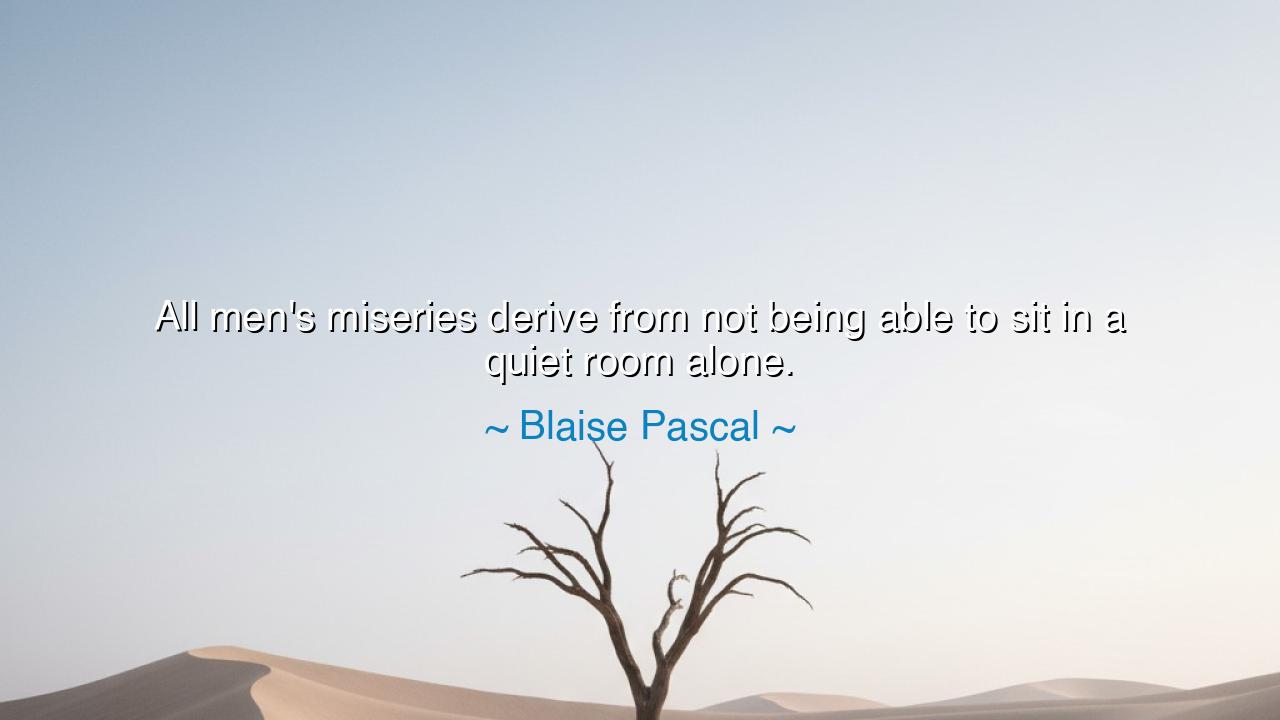
All men's miseries derive from not being able to sit in a quiet






"All men's miseries derive from not being able to sit in a quiet room alone." These words, spoken by the great philosopher Blaise Pascal, carry a deep and profound truth about the nature of human suffering. At first glance, this statement may seem simple—perhaps even an idealized view of solitude—but within it lies a timeless insight into the human condition. Pascal speaks to the heart of our modern plight: our inability to embrace silence and stillness, and the inner turmoil that arises when we are forced to confront our own thoughts without the distractions of the world. This, he suggests, is the root of many of our miseries, for in a world where we are constantly fleeing from ourselves, we fail to find peace or understanding.
The idea that misery arises from an inability to be alone is not new to the human experience. Socrates, the great philosopher, often spoke of the value of self-reflection and the necessity of withdrawing from the noise of the world in order to examine the soul. He understood that only in solitude could one truly confront the complexities of existence and achieve a deeper understanding of oneself. Similarly, the ancient stoics, like Epictetus and Marcus Aurelius, taught that true contentment lies in the ability to master the mind and find tranquility within, no matter the external circumstances. Solitude, in their view, was not a punishment but a necessary practice for cultivating wisdom and inner peace.
This theme is echoed in the lives of many figures throughout history. Consider Seneca, the Roman philosopher and statesman, who, in his writings, often spoke of the necessity of withdrawal in order to achieve clarity and mental balance. Seneca spent his later years in voluntary exile, using his time in isolation to engage in deep reflection on the nature of life, virtue, and the pursuit of happiness. He recognized that the world was full of distractions, and that the mind needed time to rest and rejuvenate if it were to function at its fullest potential. In a similar vein, Pascal urges us to recognize that our misery often arises from the external chaos we allow into our lives, and the lack of time spent in the stillness of our own minds.
Pascal’s assertion challenges us to confront the uncomfortable truth that many of us cannot endure solitude. In our modern world, we are constantly surrounded by distractions—technology, social media, and the ever-present noise of modern life. We fear being alone because it means facing the deepest parts of ourselves, the thoughts and emotions we try to avoid. Distraction becomes a shield, a way to protect ourselves from the overwhelming nature of self-reflection. But as Pascal suggests, it is precisely in our avoidance of quiet reflection that our misery is born. We run from our thoughts, unable to sit in silence with ourselves, and in doing so, we fail to gain the insight and clarity that could free us from our suffering.
Consider the life of Leonardo da Vinci, who, despite his extraordinary brilliance and achievements, was known for his periods of deep solitude. He spent hours in quiet contemplation, reflecting on his ideas and observations. Da Vinci understood that creation—whether in art, science, or invention—requires moments of stillness, where the mind can sift through ideas and give birth to new insights. His ability to find peace in solitude was integral to his success, and it was in these quiet moments that his greatest innovations were born. Da Vinci’s life teaches us that to create and to live with purpose, one must learn to embrace solitude—not as a curse, but as a tool for self-discovery and creation.
The lesson in Pascal’s words is profound and essential for our own lives. In a world that values busyness, productivity, and external achievement, we often overlook the importance of inner peace and self-reflection. Pascal teaches us that the greatest miseries of the human condition arise when we refuse to sit quietly with ourselves, when we fail to turn inward and confront the deepest parts of our soul. The restless search for fulfillment in external sources—wealth, fame, or pleasure—often leads us further from true happiness, for it is in stillness that we discover who we truly are and what we truly need.
In practical terms, we must begin to prioritize silence and solitude in our lives. Instead of seeking constant distractions, we should create moments of quiet reflection where we can engage with our own thoughts and emotions. Whether through meditation, journaling, or simply sitting in silence, we must learn to embrace stillness as a means to reconnect with ourselves. In these moments of solitude, we allow our minds to clear, our emotions to settle, and our understanding of ourselves to deepen. Pascal’s words remind us that it is not the external world that shapes our misery, but our unwillingness to look within. Through silence, we can transform that misery into peace and wisdom.
In conclusion, Blaise Pascal’s reflection offers us a timeless truth: the greatest source of our suffering comes not from the world around us, but from our inability to sit quietly and reflect on the inner workings of our soul. Like the ancients who valued solitude as a pathway to wisdom, we too must learn to embrace silence, for it is in those quiet moments that we find clarity, purpose, and freedom. Let us not shy away from being alone with our thoughts, but rather seek out solitude as a means of understanding and healing, knowing that through stillness we find the key to lasting peace.






AAdministratorAdministrator
Welcome, honored guests. Please leave a comment, we will respond soon